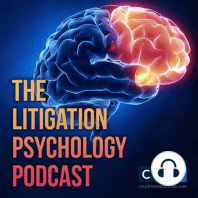30 min listen

The Litigation Psychology Podcast - Episode 117 - Comma, Danger
The Litigation Psychology Podcast - Episode 117 - Comma, Danger
ratings:
Length:
34 minutes
Released:
Apr 25, 2022
Format:
Podcast episode
Description
Dr. Bill Kanasky, Jr. covers two critical witness testimony topics: the dangers of long answers and the risks of pivoting. Long answers, which often include commas, are dangerous at deposition and at trial. At deposition, long answers from witnesses lead to the sharing of more information with opposing counsel, which leads to even more questions, and cognitive fatigue of the witness. At trial, the jury can't follow long answers and they get bored.
Witnesses who pivot during testimony open the door to a counter attack. Pivoting just gives plaintiff's counsel more information and then testimony turns into an argument, which the witness can't win.
Lastly, Dr. Kanasky talks about the anchor bias and how, once the anchor is set, all subsequent questions must be answered in the context of the anchor, and the only way to address this is to break down the cognitive schema in advance so witnesses don't fall for the anchor. Watch the video version of this episode: https://www.courtroomsciences.com/r/T8c
Witnesses who pivot during testimony open the door to a counter attack. Pivoting just gives plaintiff's counsel more information and then testimony turns into an argument, which the witness can't win.
Lastly, Dr. Kanasky talks about the anchor bias and how, once the anchor is set, all subsequent questions must be answered in the context of the anchor, and the only way to address this is to break down the cognitive schema in advance so witnesses don't fall for the anchor. Watch the video version of this episode: https://www.courtroomsciences.com/r/T8c
Released:
Apr 25, 2022
Format:
Podcast episode
Titles in the series (100)
The Litigation Psychology Podcast - Episode 1 - Nuclear Verdicts: The Litigation Psychology Podcast, presented by Courtroom Sciences, Inc. (CSI) is pleased to share Episode 1! This episode is the first in a series of podcasts on the hot topic of nuclear verdicts. Dr. Bill Kanasky, CSI Litigation Consultant, shares his ... by The Litigation Psychology Podcast